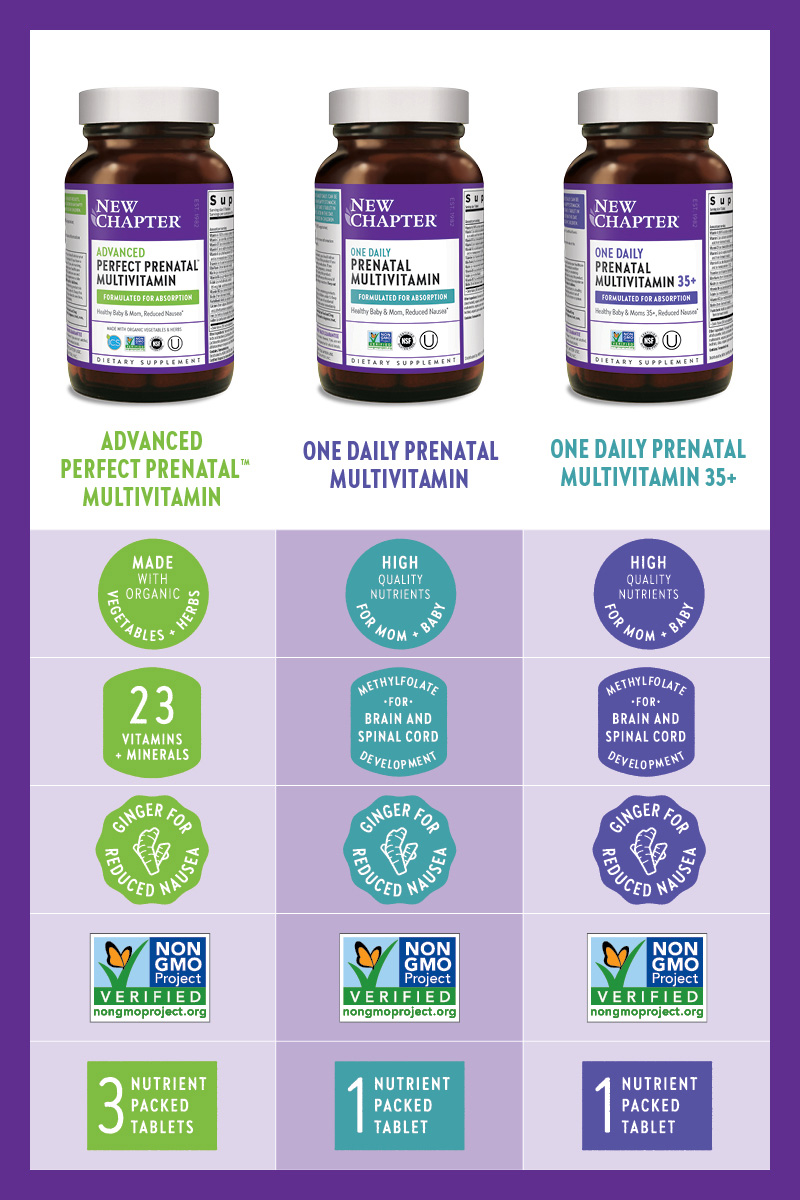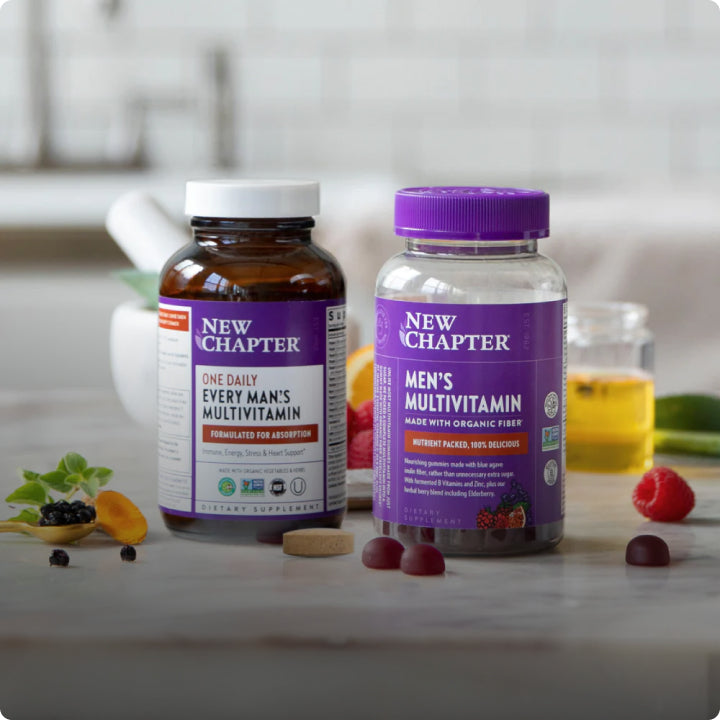6 Benefits of Prenatal Vitamins
What are the benefits of prenatal vitamins? Well, the biggest benefit is that they can provide nutritional insurance during a stage of life that is so dependent on good nutrition.
Getting nutrition “right” can be overwhelming. While perfect nutrition may be our goal, it’s a difficult target. It’s just not realistic to track each specific nutrient you consume throughout the day! And if you’re pregnant, you may be dealing with nausea, fatigue, monster cravings, and lots of questions about what exactly you and baby need during this time.
Stress not, dear friends! This is where prenatal vitamins come in. Prenatal vitamins are crafted to deliver key nutrients that your body needs during preconception and pregnancy. The best prenatal pills help you feel confident that you’re supporting wellness well—for yourself and your baby.
Benefits of Taking Prenatal Vitamins
To help answer the question, “Are prenatal vitamins necessary?” let’s consider 6 major benefits of prenatals.

1. Healthy spine & brain development from Folic Acid*
Folic Acid, Folate, Methylfolate…?? YES! You’ve probably heard of these crucial prenatal ingredients. Let’s break down what they are and why they’re key.
Folate vs Folic Acid Prenatal Definitions
Folate is a natural form of Vitamin B9 found in spinach, collard greens, and kale. (Not exactly things you crave during and before pregnancy, right?) Folic Acid refers to the compound found in fortified foods. It is often used in dietary supplements.
Both Folic Acid and Folate convert to Methylfolate. Certain individuals convert Folic Acid or Folate into Methylfolate more slowly, or sometimes not at all, due to a common gene variant . For these individuals, supplementing with the converted form of Methylfolate helps to meet their B9 needs.

B9 Benefits for Pregnancy
So why do you need Folate and when? Folate is crucial for supporting a baby’s healthy brain and spinal cord development in the first four weeks after conception. Optimal folate levels in the blood (aka plasma folate concentrations) are linked to lower risk of neural tube defects. However, it takes time for these levels to build up. So, if you’re thinking of becoming pregnant or could become pregnant, you’ll want to be taking a good multivitamin with Folic Acid now to help support your body’s levels at the time of conception.
2. Immune support from Vitamins A, C and Zinc*
Immune support is super important when you’re pregnant. That’s because you can barely take anything for coughs and colds during pregnancy. Most over-the-counter flu aids and cold medicines are off limits, and battling a head cold while pregnant is miserable. Vitamins A, C and Zinc are all essential to supporting your immune health and they can be taken during pregnancy.
Vitamin A is essential for maintaining a healthy mucosal system. It supports the production of white blood cells, too. A deficiency in Vitamin A may mean more susceptibility to infections or longer recovery times.
Vitamin C tends to be synonymous with immune health. Vitamin C is unique in that it supports both the innate and adaptive immune system . The innate immune system is your body’s first line of defense against bacteria, viruses, or other pathogens. Adaptive immunity is formed after you are exposed to these pathogens or when we get vaccinated.
We might think of drinking orange juice to get enough Vitamin C. But the truth is, orange juice is packed with sugar. Sugar, or glucose, competes with Vitamin C to get into your white blood cells, and often the Vitamin C loses. Taking Vitamin C as a supplement in responsible doses can support the immune system and the body’s needs… without added sugar.
Zinc is a favorite mineral, because it’s so versatile within the body. It supports healthy skin and helps your body produce T-cells and white blood cells. Did you know that Zinc can even block how some types of bacteria take in nutrients, starving them out so your immune system can easily dispatch them? Zinc is truly amazing.
3. Blood oxygen transport from Iron*
During pregnancy, your body uses iron to make more blood for both you and your baby. Iron helps you to produce more hemoglobin, a protein in the red blood cells. This in turn helps move oxygen from your lungs to the rest of the body, including to your baby.
The need for iron doubles during pregnancy. It’s estimated that up to 50% of women don’t get enough Iron during their pregnancy, and Iron deficiency can cause some issues. Prenatal vitamins with Iron can be a helpful daily source of Iron. You can also ask your healthcare professional about the right amount of prenatal Iron for you.
4. Energy support from B Vitamins*
The eight B Vitamins play important roles in your body’s ability to convert nutrition into energy, making them a top booster of energy in the body. B6, B9 (remember Folate!), and B12 all support the baby’s development , as well.
B3, also known as Niacin, has the ability to support healthy digestion and reduce nausea. B5 can help reduce leg cramps. B7 (Biotin) levels drop during pregnancy, which can wreak havoc on your hair, skin, and nails. Supplementing your Biotin can help support that pregnancy glow.
5. Thyroid support from Iodine*
Iodine plays an important role in helping to support your thyroid during pregnancy. The need for Iodine increases by almost 50% during pregnancy. Your thyroid uses small amounts of iodine to help with hormone production. These hormones control your metabolism and support your cardiovascular system.
Using iodized table salt is a common way to get iodine in the diet. But relying on salt alone may cause you to fall short . A 2008 study found that out of 88 samples of iodized table salt, only half contained amounts of iodine sufficient for optimal health. Plus, some salts don’t have iodine added. Also, your prenatal care provider may have advised you to steer clear of too much salt to help support healthy blood pressure levels. So, you may choose to take a supplement to get the Iodine your body needs.
6. Healthy overall pregnancy support*
Pregnancy is demanding on the body. In addition to supporting new life, the body needs support for everyday jobs, like healthy digestion, bone support, heart health, and handling occasional stress. New Chapter’s prenatal multivitamins are formulated with 20+ vitamins and minerals to meet expecting moms right where they are. Experiencing nausea? We also add a clinical dose of Ginger to help ease morning sickness. Ginger has a reputation for helping to calm your surging stomach and has been used traditionally to support women during pregnancy for centuries.
Also, keep an eye out for up and coming nutrients like Choline, with research on helping to support baby’s brain development for better information processing and supporting mom’s overall health during pregnancy.

Prenatal vs Postnatal Vitamins
Many women are told to just stay on their prenatal vitamins after birth. But did you know that the recommended nutrition levels for women change postpartum, especially if you’re breastfeeding? New Chapter’s Perfect Postnatal multivitamin is crafted with levels of vitamins and minerals especially for new and nursing moms. Perfect Postnatal supports energy, mood, and thyroid function, and includes a signature herbal blend that includes Lemon Balm.* Organic Kelp is also included, which a great natural source of Iodine. If you are breastfeeding, rest assured that Perfect Postnatal has nutrients for lactation support—B Vitamins, Vitamin D3, and Iodine.* Perfect Postnatal also delivers foods traditionally used by breastfeeding women, including organic Oats, organic Turmeric, and organic Chamomile.

Choosing Your Prenatal
Every woman’s pregnancy is unique. Consistent nutrition is important for supporting you and your baby during this amazing time of life. The key word there is consistent. Evaluate your current eating patterns and lifestyle to find what’s right for you. Check with your healthcare professional about the best supplements for your prenatal care. For example, if you’re over 40, you may have different nutritional needs during pregnancy. New Chapter’s One Daily Prenatal 35+ Multivitamin may be a great fit. If you feel like you want to incorporate more herbs and nutrients, you could pick three-a-day Advanced Perfect Prenatal™ Multivitamin.
Let your prenatal vitamin be your nutritional insurance plan, especially on those days when nausea or cravings are taking over. New Chapter’s fermented nutrients paired with our signature herbal combinations have got you covered, from A to Zinc.






